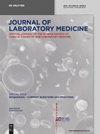Qualification and quantification of plasma cell-free DNA after long-term storage conditions in patients with benign prostatic hyperplasia (BPH): a pilot study
IF 1.1
4区 医学
Q4 MEDICAL LABORATORY TECHNOLOGY
引用次数: 0
Abstract
Abstract Objectives Free DNA is used as a cancer biomarker due to its low cost, high applicability, and fast, reliable results compared to invasive methods. This study aimed to evaluate the quantification of plasma-free DNA after long-term storage conditions and perform qualification through single nucleotide polymorphism (SNP) screening based on this DNA. Methods Plasma-free DNA samples were quickly isolated from the peripheral blood of both the benign prostatic hyperplasia (BPH) and control group participants and then maintained at −80 °C for four years. Upon thawing, first, free DNA was purified and fluorometric measurements were taken to determine the amount of DNA. Subsequently, the rs6983267, rs12628, and rs1799939 SNPs were screened in the CCAT2, HRAS, and RET genes, respectively. Results Significant results were obtained from the fluorometric measurements in terms of single-stranded DNA (ssDNA) (p<0.001). However, there was no significant difference in SNPs rs6983267, rs12628, and rs1799939 in the BPH group compared to the healthy individuals. Conclusions The data show that fluorometric ssDNA measurements are suitable for quantifying free DNA. The fact that SNP screening can be done successfully in both healthy people and BPH patients suggests that plasma-free DNA can be stored in the laboratory under appropriate conditions.良性前列腺增生症(BPH)患者长期储存后血浆无细胞DNA的鉴定和定量:一项初步研究
【摘要】目的游离DNA相对于侵入性方法具有成本低、适用性强、结果快速可靠等优点,被广泛应用于癌症生物标志物的研究。本研究旨在评估长期储存条件下无血浆DNA的定量,并基于该DNA通过单核苷酸多态性(SNP)筛选进行鉴定。方法从良性前列腺增生(BPH)患者和对照组患者的外周血中快速分离无血浆DNA样本,并在- 80℃下保存4年。解冻后,首先纯化游离DNA,并采用荧光测量来确定DNA的数量。随后,分别在CCAT2、HRAS和RET基因中筛选到rs6983267、rs12628和rs1799939 snp。结果单链DNA (ssDNA)的荧光测量结果显著(p<0.001)。然而,与健康个体相比,BPH组的snp rs6983267、rs12628和rs1799939没有显著差异。结论荧光法测定游离DNA是一种有效的方法。SNP筛查在健康人群和BPH患者中都能成功进行,这一事实表明,在适当的条件下,无血浆DNA可以储存在实验室中。
本文章由计算机程序翻译,如有差异,请以英文原文为准。
求助全文
约1分钟内获得全文
求助全文
来源期刊

Journal of Laboratory Medicine
Mathematics-Discrete Mathematics and Combinatorics
CiteScore
2.50
自引率
0.00%
发文量
39
审稿时长
10 weeks
期刊介绍:
The Journal of Laboratory Medicine (JLM) is a bi-monthly published journal that reports on the latest developments in laboratory medicine. Particular focus is placed on the diagnostic aspects of the clinical laboratory, although technical, regulatory, and educational topics are equally covered. The Journal specializes in the publication of high-standard, competent and timely review articles on clinical, methodological and pathogenic aspects of modern laboratory diagnostics. These reviews are critically reviewed by expert reviewers and JLM’s Associate Editors who are specialists in the various subdisciplines of laboratory medicine. In addition, JLM publishes original research articles, case reports, point/counterpoint articles and letters to the editor, all of which are peer reviewed by at least two experts in the field.
 求助内容:
求助内容: 应助结果提醒方式:
应助结果提醒方式:


